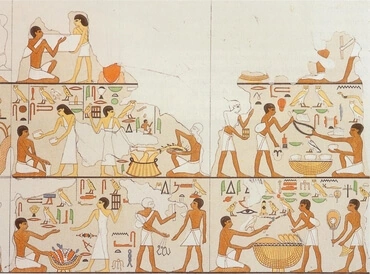5149. 'And the birds were eating them out of the basket, from upon my head' means that falsity originating in evil would consume it. This is clear from the meaning of 'the birds' as intellectual concepts and also thoughts, and consequently the things which flow from them - in the genuine sense truths of every kind, and in the contrary sense falsities - dealt with in 40, 745, 776, 778, 866, 988, 7219; from the meaning of eating' as consuming (in the original language the verb to eat also denotes to consume); and from the meaning of 'the basket' as the will part of the mind, dealt with in 5144, 5146, in this case evil coming from the will part since the basket has holes in it, 5145. From this it follows that 'the birds were eating them out of the basket, from upon his head' means that falsity originating in evil would consume it.
[2] Falsity has two different origins, doctrine and evil. Falsity originating in doctrine does not consume any form of good, for a person can have such falsity in his mind and yet desire what is good, which is why people taught any kind of doctrine, including gentiles, can be saved. But falsity originating in evil is falsity which does consume good. Evil itself is opposed to good; yet it does not by itself consume any good but relies on falsity to do so. For falsity attacks the truths which are the defenders of good, those truths being so to speak the ramparts behind which good resides. Falsity is used to attack those ramparts, and once this has been done, good is given over to destruction.
[3] Anyone unacquainted with the fact that 'birds' means intellectual concepts will inevitably suppose that when mentioned in the Word the expression 'birds' is either used to mean birds literally or else is used, as in everyday speech, in a figurative sense. Except from the internal sense no one can know that 'birds' means things belonging to the understanding, such as thoughts, ideas, reasonings, basic assumptions, and consequently truths or falsities, as in Luke,
The kingdom of God is like a grain of mustard seed, which someone took and sowed in his garden, and it grew and became a big tree so that the birds of the air dwelt in its branches. Luke 13:19.
'The birds of the air' here stands for truths.
[4] In Ezekiel,
It will turn into a noble cedar, and under it will dwell every bird of every sort; 1
in the shade of its branches they will dwell. Ezekiel 17:23.
'Bird of every sort' stands for truths of every kind. In the same prophet,
Asshur was a cedar in Lebanon. In its branches all the birds of the air made their nests, and under its branches every beast of the field brought forth, and in its shadow dwelt all great nations. Ezekiel 31:3, 6.
'The birds of the air' stands in a similar way for truths.
[5] In the same prophet,
Upon its ruin will dwell every bird of the air, and on its branches will be every wild animal of the field. Ezekiel 31:13.
'Bird of the air' stands for falsities. In Daniel,
Nebuchadnezzar saw in a dream. Behold, a tree in the midst of the earth; under it the beasts of the field had shade, and in its branches dwelt the birds of the air. Daniel 4:10, 12, 14, 21.
Here also 'the birds of the air' stands for falsities.
[6] In Jeremiah,
I looked, and behold, there was no man; and every bird of the air had flown away. Jeremiah 4:25.
'No man' stands for no good, 4287, 'the birds of the air which had flown away' for the fact that truths had been dispersed. In the same prophet,
From bird of the air even to beast they have flown away, they have gone away. Jeremiah 9:10.
Here the meaning is the same. In Matthew,
A sower went out to sow; and some fell on the pathway, and the birds came and devoured it. Matthew 13:3-4.
Here 'the birds of the air' stands for reasonings, and also for falsities. The same meaning may be seen in many other places.
Footnotes:







